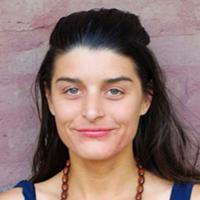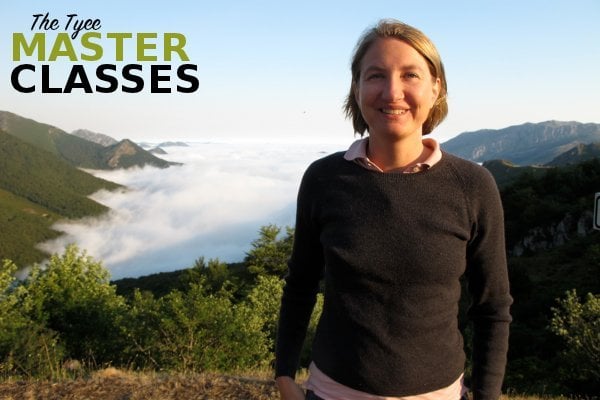[Editor's note: In anticipation of her upcoming Master Class at The Tyee, here's a chance to get acquainted with Alisa Smith, award-winning journalist and bestselling author of The 100-Mile Diet. You know her as the daring and determined "locavore" who gave up processed snacks and winter tomatoes for a year of local-only eating. In this interview, Tyee food reporter Colleen Kimmett introduces you to the writer behind the pages -- passionate story-teller, talented wordsmith and long-time Tyee contributor. Smith's enthusiasm for the written word is contagious. Do you have a story to tell? We hope to see you at her half-day writing workshop, "From Memoir to Personal Journalism," in the Tyee newsroom March 31. Beginner and experienced writers are welcome, but space is limited. Click here to reserve your seat.]
Alisa Smith learned to write "the old-fashioned way," from experienced editors and journalists as a volunteer at the University of Victoria's student newspaper, The Martlet.
She has gone on to become an award-winning journalist and author, perhaps best known for The 100-Mile Diet, which she co-authored with partner J.B. MacKinnon. The book, which started as a series on The Tyee, is a memoir chronicling the couple's year of local eating. It won a national Cordon D'Or culinary literature award, a Canadian Culinary Book Award and a BC Books Prize.
Smith's writing has been described as "informative, personal, charming and inspiring," and she has lectured on writing at Canadian and American universities.
On Saturday, March 31, you're invited to join her in The Tyee's Vancouver newsroom for "From Memoir to Personal Journalism" -- a half-day writing workshop that kicks off this spring's Master Class series. Participants will learn to craft their own strong narrative based on personal experience with tips to expand into first-person journalism on any subject. Reserve your spot here.
The bottom line, says Smith, is that "anyone can potentially be a writer" with the right tools. Here's what else she had to say about her craft.
What does your ideal writing day look like?
"It's very quiet. It is sunny and I have a nice view out the window. Basically I like to work in the mornings, alone, and then I like to go for a bike ride in the afternoon to unwind."
When you were researching and writing The 100-Mile Diet series and book, what was your method for recording conversations or remembering details that you wanted to include?
"It was a mix. Formal interviews I recorded or took notes in traditional fashion. For things that were more day-to-day interactions, it was more like keeping a diary, I suppose. At the end of each day, I would write down all of the things that had happened and what people had said to me.
"The main thing that I use when I'm out and about is just a notebook. If I feel like it's more of an interaction rather than an interview, I'll wait until immediately after and then I'll write it down.
"I sort of try to memorize the core sentences people say that really characterize them, or would be the important things about them, and focus on remembering those sentences and making sure I get them down afterwards. (Recorders) are obviously the best way of recording things in a formal interview situation, but some people seem kind of put off by them."
Are all of your life experiences and interactions potential material for a book or an article, as far as you're concerned?
"I suppose so. That wasn't the way I started out writing. I did much more traditional journalism to begin with -- interviews that were about that other person and not about myself -- but that kind of evolved over time.
"One of the bigger non-fiction projects that I'm starting into right now that I would like to be a book is the idea of connecting with a place. How do you fall in love with a place, how do you create community in a place? I will definitely be bringing in personal experiences for that.
"Sometimes you don't know at the time -- you're just kind of living your life -- and you take stock every month or so and say, 'Oh wait a second, that was actually something that was really meaningful to me now that I've processed it,' and it could well be something that could form part of a book."
What are the sources you draw from for that type of writing? Do you have a personal journal, for example?
"I do. And I'll just sort of periodically stop if I feel inspired by the poetry of a situation. I will write something and recall the interaction that I've just had, and that's a resource to draw on later."
Have you ever mined your digital world for material? Like Twitter or Facebook?
"I did in some ways for The 100-Mile Diet. When we did our blog online on our own website, we got tons of emails from people and that became part of the content for 100milediet.org, although the book was already written at that point. I give a lot of talks on The 100-Mile Diet and I incorporate some of those stories into the talks that I give."
Do you ever wish you could turn the "writer" part of your brain off?
"It's very rare that I do because I actually find that it's a fun way of engaging with the world. For me, my curiosity is what makes me a writer. My compassion for, and interest in other people is what makes me a writer. And I do actually like traveling if I have a purpose, which writing can give.
"But then, once in a blue moon -- because James, my partner, is also a writer -- we want to just have an actual pure holiday. We went to Cuba for two weeks this fall and we decided to just live and not think about interviewing anyone or following any bits of information that might be good in an article later.
"But in general, I'm just so curious about things. Writing is who I am and I don't usually want to turn that off."
Do you have a favourite memoirist?
"I'm actually quite fond of Simone de Beauvoir. I have read The Second Sex, but I almost think that her truer memoir is The Mandarins.
"Because in times past, people kind of put their real life experiences into their fiction and didn't actually change it very much. They might just change the names or a few elements of the things that happened to them, and then call it fiction, when really it was closer to non-fiction. They used that as a way of protecting people close to them or protecting themselves.
"The Mandarins is like this. It's just a really neat portrait of their (de Beauvoir's and Jean Paul Sartre's) work as journalists during the occupation of France by the Nazis."
Do you feel compelled to change names or place details if the people you're interacting with at the time don't know you're a writer?
"Not very often. I might just do something like just use their first name, so that they have a little more anonymity. I would more feel inclined to do that if I was doing reporting in, say a war-torn country, where putting the person's name in the piece could actually result in a threat to their life. That would be the only case where I would consider totally changing something."
Has anyone ever said to you, "You're not going to write about this, are you?"
"No, although my mom wasn't necessarily thrilled at first to have been included in The 100-Mile Diet. Which I did not expect at all, or else I would have checked it with her. But she's fine with it now.
"That's the thing I often find surprising in journalism. People you talk to about what you think is a more controversial topic are rarely upset at how it turned out in print -- at least not in my experience.
"It is often the strange things where you just do include a person as a character and for whatever reason, the way you see them is not necessarily the way they see themselves, and then they get upset.
"You do have to be careful, for sure, in the non-fiction world. I try to be compassionate to people but you don't always know if your world view clashes too much with their worldview or their view of themself."
What, in your opinion, is the difference between an okay piece of writing and a really great piece of writing?
"There are two elements. One is if I can tell that the writer worked really hard. If they have a lot of different kinds of information, information I haven't heard before. Or they maybe processed the information in a way I haven't seen or heard before, giving it a fresh view on things.
"The other thing -- and maybe this is a bit ephemeral -- is if you can feel soul in the piece. If the person really cared about the issue and a put a lot of themselves into it. You can tell if a writer is bored with a subject or doesn't really understand it, and as a reader I think that's when I'm more inclined to be bored with the piece."
What are you hoping attendees will take away from your Master Class at The Tyee?
"From my perspective, anyone can potentially be a writer and I want people who have less experience to gain that confidence. Everyone has at least one really great story to tell about their lives. Some people have many more than that, but even if you are a person who has that one great thing, so far, if you broaden your skill set you can transfer that passion and that first-person perspective into the broader world."
Alisa Smith kicks off The Tyee Master Classes on March 31 with her half-day writing workshop, "From Memoir to Personal Journalism." Learn more about the workshop -- and register -- here. ![]()
















Tyee Commenting Guidelines
Comments that violate guidelines risk being deleted, and violations may result in a temporary or permanent user ban. Maintain the spirit of good conversation to stay in the discussion.
*Please note The Tyee is not a forum for spreading misinformation about COVID-19, denying its existence or minimizing its risk to public health.
Do:
Do not: